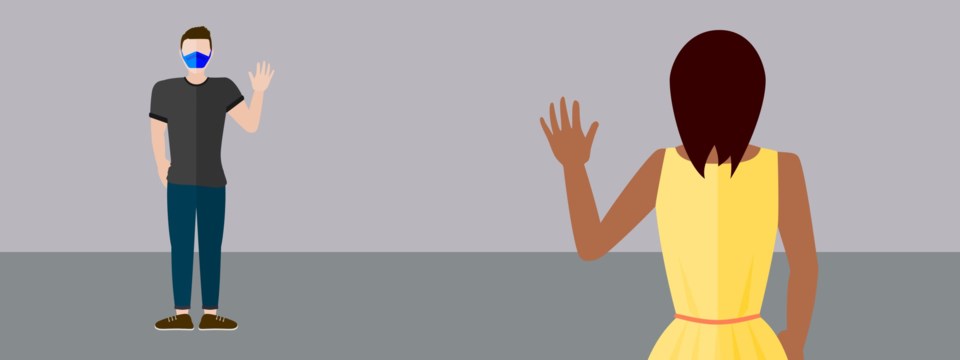Mapping out the dating scene can be an already complicated situation. With the onset of the novel coronavirus, adults have had to adapt their navigational skills in a whole new way. For some, like Katlin Morrison, 27 of Denton County, dating during COVID-19 has meant some adjustments, but ultimately, success.
“I was really apprehensive at first to meet anyone and spent a lot more time talking to people before deciding on meeting up with anyone,” Morrison says. “That was my rule in general, but before [the pandemic] I felt pressured to meet up sooner.”
Waiting to meet someone in person took the pressure off of Morrison to follow through when she wasn’t sure yet whether someone might be an ideal partner. Asking key questions early on, especially these days, helps weed out potential partners that may not be compatible, according to Forbes.
Morrison met her current partner six months ago. After meeting on Tinder, they had a socially-distanced first date in a parking lot. He moved in shortly after their first encounter when a roommate tested positive for COVID-19. Now, they are six months strong and Morrison doesn’t regret a thing.
Socially Distanced Dating
A National Public Radio (NPR) article on dating during COVID-19 recommends having a conversation about pandemic behavior before a meet-up whether they were wearing masks out in public and how frequently they were seeing other people are important indicators for individuals looking to date.
“People’s general attitude toward the pandemic gave me a good marker, and just plain asking how they're protecting themselves and others,” Morrison says.
Matt, 30 of Dallas County, says as much from his personal experiences. “The way I would look at the risk is I would see how the other people’s, the other guy’s, work environment was,” he says. “If he was meeting up with lots of friends, or if he was just staying home. Generally, I met with people who worked from home and didn’t go out much during the pandemic.”
Matt met-up with six separate people from March through November and has managed to remain COVID-19 negative.
“My main concerns were potentially getting other people sick from meeting up or hooking up with somebody,” he says. “I didn’t want to do that, I didn’t want to get my employees sick or my roommate or anyone I would potentially come into close contact with.”
One man he spoke to wore a mask with one of his partners during a hookup. It’s not unheard of either. Dr. Joyce Sanchez, an infectious disease specialist at the Medical College of Wisconsin, reported to NPR that masks during sex would likely decrease the transfer of viral particles to partners; however, the effectiveness is still unknown.
Taking precautions
Hackensack Meridian Health recommends that potential partners get a COVID-19 test before becoming sexually intimate or isolating for two weeks prior. The Center for Disease Control and Prevention has scarce guidance on how to navigate sexual relationships or casual dating.
But the circle of life must go on.
Marques Vega takes two showers a day with antibacterial soap and has a strict regimen of vitamins, masks, hand sanitizer, alcohol-based cologne, preferably Old Spice or Brut, and freshly washed clothes for the day. The 32-year-old Tarrant County resident even received a flu shot this year. Vega’s deal breaker: they can’t be sick or have traveled recently to a hotspot. He has gone on two dates, one in February and one in August, with success. To this day, he and his dates have not tested positive for COVID-19.
Vega’s concern was getting the virus without knowing and passing it along to friends and family, echoing both Matt and Morrison’s experience. His advice: “Establish boundaries by just simply asking questions and answering truthfully.”
In Love in Quarantine
Dating during COVID-19 is one thing, but couples in long-term relationships have felt the strain during this world health and economic crisis. In Denton, 33-year-old Alec had his whole world and relationship fall apart without warning. He was a Denton local business owner and had to close his shop after the quarantine in March.
“It [the pandemic] kinda sets the tone for everything,” he says.
For Alec, quarantine was a good thing for his relationship--or so he thought at first. No more excuses, no more meetings or business or hiccups to encroach on his time with his partner. But his partner’s struggle was a silent one. What was a reprieve for him was suffocating for her and the communication was just not there.
“Your feeling of being in control can only be stretched so far, and be pretended so far,” he says.
Neither Alec nor his partner had answers to the tough questions and pre-existing problems, which were exacerbated by the quarantine. He encourages communication early on among couples and suggests having a mediator to turn to when things get tough, professional or otherwise.
“You have to trust that you and the other person say what they mean,” Alec says. “You can really only control what you do and what you say and what you think. If you think negative then the situation could turn negative. But if you think positive, you’re doing your part to make it positive.”
He swears by the practice of over-appreciating your partner. Whether you think you’ve said the same before or feel like it’s been done, he says, do it again.
Dating during COVID-19 can seem treacherous or daunting at best. But cleanliness, taking time to converse with a person and making calculative decisions on who to meet up with are more than enough to make the move in your romantic life.
“Honesty is the best policy,” Morrison says. “Either someone is going to be okay with your boundaries, or they're not. And if they're not, then that's not someone who will respect you.”
Originally published in the 2021 January/February issue.



![Top 5 Reads Of The Week [Jan. 27-31]](https://www.vmcdn.ca/f/files/localprofile/images/news/screen-shot-2024-10-03-at-115420-am.png;w=120;h=80;mode=crop)
